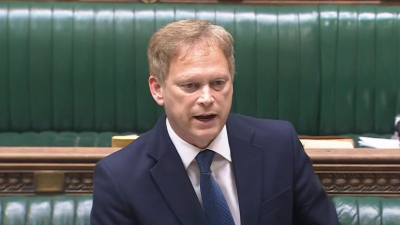Plastic Crisis in the UK: A Call to Action
With Britons discarding a staggering 1.7 billion pieces of plastic each week, the nation faces a crisis spiraling "out of control," according to environmental campaigners. The alarming statistics reveal that the average household disposes of 60 plastic items every seven days, totaling a staggering 90 billion annually across the country.
The urgency of the situation was underscored by the participation of over 225,000 individuals in The Big Plastic Count, who meticulously tracked their plastic waste. Among the most frequently tallied items were packaging for snacks, fruits, and vegetables.
Shocking revelations from the study conducted by Greenpeace and Everyday Plastic unveil that the UK ranks among the highest in the world for per capita plastic waste generation, second only to the United States. Moreover, a mere 17% of plastic remnants were recycled, while a concerning 58% were incinerated, exacerbating climate change with each tonne of plastic burnt emitting more carbon dioxide than burning coal.
The reliance on incinerators, which contradicts the government's pledge to achieve net zero emissions by 2050, has sparked outcry from environmental advocates. Greenpeace and Everyday Plastic are urgently appealing to policymakers and retailers for decisive action, particularly ahead of the Global Plastic Treaty negotiations in Canada.
Their plea includes calls for a binding global target to slash plastic production by at least 75% by 2040. Additionally, they advocate for the swift implementation of innovative reuse and refill systems, cessation of approvals for new incineration plants, and a complete ban on plastic waste exports by 2027.
Rudy Schulkind, a political campaigner at Greenpeace UK, warns that unless drastic measures are taken, the plastics crisis will continue to escalate, with production projected to triple by 2050 unless the industry's trajectory is altered.
As the plastic deluge threatens to engulf the nation, concerted efforts are imperative to curb its proliferation and safeguard the planet for future generations.
Navigating the Complexities of Plastic Solutions
In the battle against plastic pollution, the ramifications extend far beyond mere environmental concerns, with marginalized communities bearing the brunt of the crisis. These communities, often situated in close proximity to incineration facilities or subjected to the consequences of waste exportation to the Global South, face disproportionate harm.
Laura Burley, the driving force behind the extensive project tracking the UK's plastic consumption, paints a stark picture of the challenge ahead. The sheer volume of plastic waste generated annually is so vast that, if counted individually, it would take until 2077 to tally every piece. Yet, amidst the overwhelming scope of the problem, Burley remains resolute that viable solutions exist, contingent upon the collaboration of policymakers and corporate entities.
As advocacy groups like Greenpeace rally for action, particularly targeting single-use plastics, the imperative for change is undeniable. However, crafting effective policies demands a nuanced approach to avoid unintended consequences. Merely substituting plastic with alternative materials such as metal or paper containers may inadvertently escalate carbon emissions.
Recent analyses underscore the complexities of packaging materials' environmental footprint. While plastics offer advantages in reducing food spoilage, their counterparts—paper, steel, and aluminum—pose challenges in terms of energy-intensive production and transportation. Despite the environmental drawbacks of plastics, they serve crucial roles in mitigating food waste and lowering carbon footprints associated with spoiled goods.
Nonetheless, this does not absolve the urgent need to address the adverse effects of plastic waste, from ineffective recycling systems to the carbon emissions of incineration. Initiatives such as plastic taxes and stringent labeling regulations have shown limited efficacy, while the carbon footprint of incinerating unrecyclable plastics rivals that of burning coal.
Looking ahead, there is potential for a reimagined future for plastics. By harnessing innovative engineering and transitioning to non-fossil sources, plastics could become entirely reusable or recyclable, paving the way for a more sustainable paradigm.
Amidst the revelations of the plastic count, one participant expressed shock at the scale of the issue, underscoring the imperative for collective action and systemic change.
Calls for Urgent Government Action to Combat Plastic Pollution
Amidst growing concerns over the pervasive presence of plastic pollution, voices like Chloe Scrivener from Dorset are urging for decisive government intervention. Scrivener emphasizes the urgent need for substantive changes to safeguard the planet for future generations, citing the imperative to protect both her son's future and the wellbeing of wildlife.
Expressing a desire to contribute to tangible solutions, Scrivener underscores the necessity for swift and comprehensive action from policymakers. She highlights the alarming ubiquity of plastic waste and its detrimental impact on the environment, emphasizing the urgency of addressing this pressing issue.
In response to mounting pressure, a spokesperson from the Department for Environment, Food and Rural Affairs (DEFRA) asserts that efforts are underway to accelerate progress towards the ambitious 2050 goal of eliminating avoidable waste. Highlighting past initiatives such as the reduction of plastic bag usage and bans on single-use plastics like straws, stirrers, and cotton buds, DEFRA reaffirms its commitment to combatting plastic pollution.
Moreover, DEFRA expresses support for proposals advocating for a new legally binding plastics treaty, aimed at curbing the proliferation of plastic waste on a global scale.
As calls for action intensify, the onus lies on governments and international bodies to enact robust policies and regulations to address the plastic crisis and secure a sustainable future for all.
In conclusion, the urgency of addressing plastic pollution cannot be overstated. Voices like Chloe Scrivener's echo the growing sentiment for immediate and comprehensive government action to mitigate the detrimental effects of plastic waste on our planet and its inhabitants. As individuals, communities, and governments unite in the fight against plastic pollution, it is imperative to implement effective policies, embrace innovative solutions, and foster a collective commitment to sustainability. By working together, we can forge a path towards a cleaner, healthier future for generations to come, where plastic pollution is no longer a threat to our environment or the well-being of all living beings.







